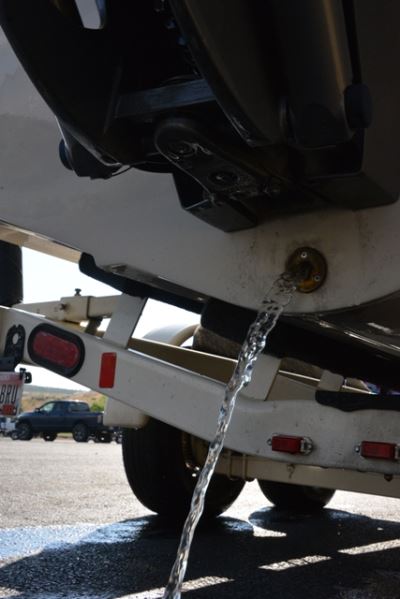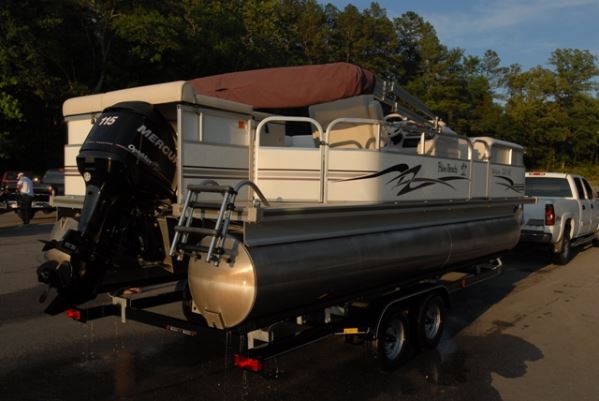
It's a great feeling purchasing your first pontoon or deck boat. After spending days and weeks comparing and scrutinizing seemingly every manufacturer and boat available, to finally narrow it down to one and get through all the financing steps—whew! It feels like it's high time to get out on the water and have some fun.
But not so fast—if you aren't careful, you may end up making a bigger splash than you intended. Here are some rookie mistakes that can make you the center of attention at your local lake in a way you never intended. Whether your mistake leaves you floundering hundreds of feet from shore or doing hundreds of dollars worth of damage to your boat, it's always better to learn from others' errors than your own.
1. Secure And Strap
First off, always make sure your boat is strapped to the trailer when you want it to be, and unstrapped when it's ready to enter the water. A deck boat may appear to be a heavy vehicle, but accelerate fast enough and it'll slide right off if there's nothing keeping it in place. Once, in my younger days, I forgot to secure the back gate of a trailer full of construction waste I was hauling to a landfill. I ended up scattering plywood and rebar over a small section of the freeway before I figured out what was happening; I can only imagine the trouble that would result if I dumped an entire boat onto the road instead.
And on the flip side, be sure you unstrap the boat from the trailer when sliding it into the water. One new boater finally figured out why the boat seemed stuck in place only after he and his buddies had snapped one of the restraining straps clean in half.
2. Brake On
Everyone's heard the story about the guy whose new truck was pulled into the lake thanks to a parking brake that was left off. But just in case you haven't, it's a reality. If you aren't the one backing the trailer into the water, make sure the person responsible knows to put that brake on before even thinking of leaving the vehicle. Even if you think you can sprint to the moving SUV, open the door and gun the engine before you're too deep in, the laws of momentum take over somewhere, and it might be too late even then. Just trust me on this one: leave the brake on.
3. No Wake Means No Wake
Assuming you've successfully managed to get into the water without breaking anything, don't let your excitement get the best of you—tearing off at full throttle is a quick way to make enemies and have to deal with other negative repercussions. No wake zones exist for a reason, and are generally well-marked. If you're not sure how far the zone extends, or what markers to look for, ask someone on the dock, and they'll be more than glad to help you out.
 4. Tie One On
4. Tie One On
Pontoon boats are so sturdy on the water that it can be hard to remember they'll drift as well as any other kind of boat. Something about the lack of rocking convinces even longtime boaters that they aren't even on the water. Forget this at your peril—learn some basic knots and double check them to make sure you're securely tied to that floating dock or rock on the beach. Otherwise you'll find yourself watching that newly purchased prized possession float away and become subject to the elements. Don't let this happen to you.
5. Watch For Oncoming Traffic
There are no easily visible lanes on the water, and other craft can approach your deck boat from all angles. Keep your head on a swivel, and instruct passengers to help you keep an eye out for those you share the water with. A quick way to develop a reputation as a careless boater is to cut someone off or rock an anchored boat.
 6. Drain Plug? What Drain Plug?
6. Drain Plug? What Drain Plug?
Most boats come with a drain hole built right into them. While this may seem like a bad idea at first glance, it's only a problem for the inexperienced or distracted boater. Many boat sinkings occur right at the dock, thanks to some forgetful captain neglecting to check if the drain plug was secure. Today, you can purchase drain plugs that actually have alarms that will sound if the engine is engaged and the plug is not secure. If you don't want to trust your memory on something so vital, maybe picking one up is the way to go.
7. Docking Woes
When coming back into the dock, remember that no wake zone, and take your speed to a point lower than you think it should be. Accounting for wind speed and currents is tricky enough when the boat is idling; if you come roaring into the dock at 20 miles per hour, it's nearly impossible to accurately land your boat where you want it. Pontoon boats, especially, have a higher profile than some recreational boats, and can be turned and twisted in ways you often cannot see coming. Take it slow and ask others for advice. Even if you do ding your new baby by coming in a bit too fast, just think of it as adding character to an otherwise spotless craft.

8. Engine Off
And finally, when driving the boat onto the trailer, kill the engine and trim the engine up. Some of these new outboards are so quiet that boaters have been known to leave them running all the way home by accident. This can lead to costly repairs and by trimming your engine up you could save your prop from a launch ramp scrape as you’re pulling the boat out.
Unfortunately, this isn't a complete listing of everything that can go wrong on a boat's maiden voyage...Murphy has seen to that. But stick to these basics and it should be hard for even the most grizzled veteran out there to label you a rookie. And even if you do find yourself in an embarrassing situation thanks to your inexperience, keep in mind that everyone has to deal with the learning curve, and those laughing at you probably have a story much like yours to tell, if you ask.

